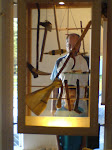Några morgontankar som jag slängde ner i skrift innan jobbet: Misstron mot politiker borde bekymra politiker! Bekymra dem ganska mycket. Jag började fundera om vårt demokratiska system är på väg att kollapsa? Tilltron till det allt mindre, i alla fall bland vissa kategorier? Misstron allt större.
Och detta gynnar högerextrema och allt mer auktoritära krafter, samt s.k. ”starka ledare”? Personer som inte har fått den position de fått i kraft av verklig förmåga.
Dessutom så får vänsterpolitiker ganska liten plats i media, vilket innebär att människor inte får några alternativ. Dessa politiker har svårt att nå ut, just på grund av media och deras ovilja att skriva om dessa?
Hur många människor som drabbats av de försämrade trygghetssystemen tiger och har tigit av skam över sin situation istället för att kraftfullt ifrågasätta hur de har det och om det är rätt att de har det som de har det? Kanske av skam hållit tyst om en situation som lett till den sits i vilken de befinner sig, men som de med rätta kanske kunde ha ifrågasatt?
Och detta med misstro och tillit, överdrivet beroende eller inga beroendebehov alls, dvs. när vi uppträder som om vi inte kan göra något av egen kraft utan andras hjälp eller omvänt strävar efter att uppträda som om vi aldrig behöver hjälp. Det senare kan jag se i frågor om antingen kollektiv ELLER individualism.
Men i ett sunt samhälle, en sund värld, en sund grupp, en sund familj så samexisterar båda. Dvs. i ett samhälle, i världen, i gruppen, familjen, kollektivet så kan man ha eller inte ha den djupaste respekt för individen och dess integritet och gränser i en gemenskap.Och om detta är möjligt beror på dess medlemmar och dess ledare.
Och detta kan saknas både i det totalt kollektivistiska som i det totalt individualistiska samhället!
Vilket innebär att även i ett totalt individualistiskt samhälle så kan man sakna respekt för den enskilda individen. Ett totalt individualistiskt samhälle innebär inte alls automatiskt att man verkligen respekterar den enskilda individen. Man kan se ner på denne/denna med förakt för svaghet.
Och tillit och misstro kan gå i båda riktningar; inte bara från individen mot samhälle, utan också i andra riktningen; från samhället mot dess individer. Det är likadant med solidaritet och lojalitet också?
I ett sunt samhälle så samexisterar grupp och individer. Individerna där inser att vi som människor både är beroende av andra människor, men också att vi i andra avseenden är oberoende.
Och det där med misstro och tillit läste jag ju faktiskt om för länge sedan under mina studier slår mig nu. Jo, det var visst Erik Homburger Erikson som lanserade detta begrepp apropå barn och deras utveckling?
Men jag tror att vårt förhållande till misstro och tillit har en verklig bakgrund - om vi verkligen kunde lita på tidiga viktiga vuxna. Jag håller inte riktigt med Erikson eller Piaget eller Freud idag. Jag tror att det som de tillskrev som varande medfödda drifter handlar om verkliga händelser som formade oss.
Men jag tror vi kan göra något åt detta, fast det bästa vore att vi inte hade blivit tvungna att göra det. Och jag tror att de som förnekar dessa tidiga saker skadar mest för andra människor. Se också återigen psykohistorikern Bob Scharf i hans essä "Leaders" (eller "Ledare"). Se tidigare inlägg om backward psychoclasses (efterblivna psykoklasser) och empathy deficits (empatiunderskott).
Hur hanterar en vuxen människa dessa saker? För med rätta kan även en vuxen känna misstro och brist på tillit, eller tilltro och tillit? Men hur hanterar vi dessa saker? Genom handlingsförlamning och hjälplöshet eller genom att aktivt försöka ändra sakernas tillstånd. Men det senare kan vi göra på ett konstruktivt eller ickekonstruktivt sätt. Dvs. inse när vi faktiskt kan och borde göra något och när vi inte kan göra något och kanske bör söka oss någon annanstans om det är möjligt.
Jo, vad vi ser, kanske inte minst i makten (på flera nivåer) är effekterna av mycket tidiga upplevelser, som förnekats.
Och, nej, det finns inte bara ett enda rätt sätt att föra politik.
Läs Paul Krugman i "Moral decay? Or deregulation?" eller "Moraliskt förfall? Eller avreglering?" Han spårar problemen i USA nu tillbaka till 1980.
Men, hmmm, skriver Krugman, beror det som hände då på tillbakagång vad gäller Kalvinistisk dygd, hände inte något annat runt 1980?
”Kan inte riktigt minnas… någon vars namn börjar på bokstaven ’R’?
Jo, Reagan gjorde det.
Vändningen mot budgetunderskott var ett direkt resultat av den nya Irving-Kristol inspirerade” politiska strategin med skattesänkningar, där man inte oroade sig för 'accounting deficiencies of government.'
Under tiden så kan den plötsliga ökningen av hushållsskulder i hög grad tillskrivas finansiell avreglering.
Så vad hände? Förlorade vi vår ekonomiska moral? Nej, vi var offer för politik.”






























